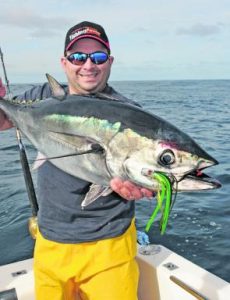Mastering the Art of Catching Tuna through Trolling
Trolling for tuna is not merely a fishing technique; it’s an intricate dance between angler and fish,
requiring skill, patience, and a deep understanding of the ocean’s dynamics. In this comprehensive guide, we’ll delve into the nuances of trolling for tuna and explore key strategies to optimize your success on the water.
Understanding Tuna Behavior
To effectively target tuna, it’s crucial to comprehend their behavior patterns. Tuna are highly migratory species, constantly on the move in search of food and optimal environmental conditions. They traverse vast expanses of ocean, from coastal waters to the open sea, following prey abundance and favorable temperature gradients.
Tuna are voracious predators, known for their affinity for baitfish, squid, and other marine organisms. They’re attracted to areas rich in food sources, such as upwellings, temperature breaks, and underwater structures. By studying these habitat features and their relationship to tuna behavior, anglers can better predict where to find these prized fish.
Trolling for Tuna Techniques
Trolling is a versatile fishing method that allows anglers to cover large areas of water while presenting baits or lures at various depths and distances from the boat. Here are some essential tips to enhance your tuna trolling success:
- Select the Right Lures – Tuna can be selective feeders, so having a diverse selection of lures is essential. Cedar plugs, skirted trolling lures, and feather jigs are popular choices. Experiment with different colors, sizes, and actions to determine what triggers the most strikes. More about Tuna Lures
- Adjust Your Speed – Tuna often have a preferred feeding speed, so be prepared to adjust your trolling speed accordingly. Start at a moderate pace and vary your speed until you find what works best on any given day. In Depth guide to tuna trolling
- Use Teasers – Incorporating teasers into your trolling spread can attract curious tuna and increase your chances of hooking into fish. Teasers create additional visual stimulation, mimicking a school of baitfish and enticing predators to strike. More info about tuna teasers and spreader bars.
- Vary Your Depths – Tuna can be found at different depths depending on factors such as water temperature and the availability of prey. Experiment with trolling at various depths using planers, diving plugs, or downriggers to target fish holding at different levels in the water column.
- Pay Attention to Signs – Keep an eye out for signs of tuna activity, such as diving birds, surface splashes, or feeding frenzies. These indicators can lead you to productive fishing areas where tuna are actively feeding.
Tuna Trolling Gear and Equipment
When gearing up for tuna trolling, it’s essential to invest in high-quality equipment that can withstand the rigors of offshore fishing. Start with a sturdy trolling rod designed specifically for battling powerful tuna species. Look for rods with a strong backbone and enough flexibility to handle the unpredictable movements of a hooked fish. Pair your rod with a reliable trolling reel equipped with a smooth drag system capable of applying consistent pressure during long fights.
In terms of terminal tackle, opt for heavy-duty monofilament or braided fishing line with a high tensile strength to withstand the sharp teeth and powerful runs of tuna. Consider using a top-quality leader material to prevent fish from breaking off near the boat. When it comes to lures, stock your tackle box with a variety of options to cover different trolling scenarios and mimic various baitfish species. Additionally, don’t forget essential accessories such as fighting belts, gaffs, and fish handling gloves to ensure a safe and successful fishing experience.
By honing your trolling skills and understanding the intricacies of tuna behavior, you can greatly increase your chances of success on the water. Remember to remain adaptable and willing to adjust your tactics based on changing conditions and fish behavior. With dedication and perseverance, you’ll be well-equipped to master the art of catching tuna through trolling. Happy fishing!
Catching Tuna through Trolling FAQ
- What type of tuna species can be caught through trolling?
- Trolling is effective for various tuna species like yellowfin, bigeye, bluefin, and albacore. Each species may have different preferences, but all can be caught through trolling.
- What is the best time of year for tuna trolling?
- The best time varies by location and species. Research local fishing reports and consult experienced anglers to find the optimal time in your area.
- How fast should I troll for tuna?
- A typical trolling speed ranges from 6 to 8 knots. Experiment with speeds and adjust based on the fish’s response.
- What depth should I troll for tuna?
- Cover different depths using planers, diving plugs, or downriggers to target tuna effectively.
- What types of lures are most effective for trolling tuna?
- Tuna strike various lures, including cedar plugs, skirted trolling lures, and feather jigs. Match the lure to prevailing conditions and fish preferences.
- Any special techniques for hooking and fighting tuna while trolling?
- Stay vigilant, be ready to strike, and use proper fighting techniques. Heavy-duty tackle, strong knots, and smooth drag settings help prevent break-offs.
Check out other recommended products for Tuna Fishing
Stay tuned for more tips and tricks on How To Catch Tuna.

 Penn Tuna Fishing Rod & Reel Combo
Penn Tuna Fishing Rod & Reel Combo Braided Fishing Line
Braided Fishing Line Saltwater Trolling Lure for Tuna
Saltwater Trolling Lure for Tuna